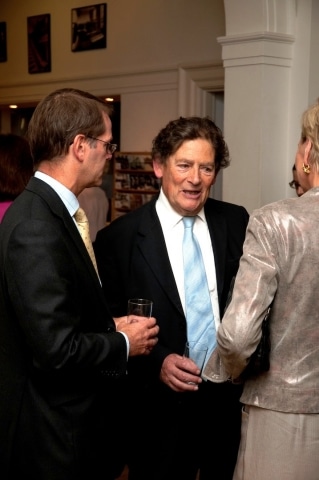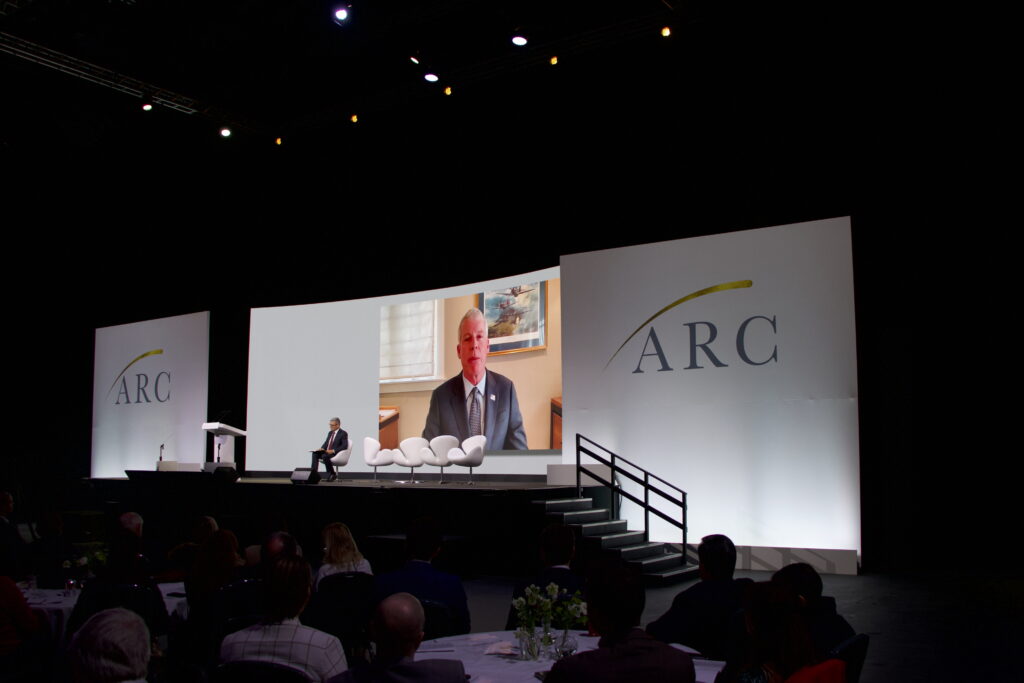Lord Lawson is the latest leader in the long history of climate denial. In the past, such anti-science groups have been funded by industry. So where has Lawson got his £1million in funding? The concluding post in our inaugural series, An Honourable Man.
There remains one incredibly important thing the public still does not know about Lord Lawson: where does he get all the cash to run his climate sceptic charity? Lawson did not get everything his own way during his appearance before the science committee in March 2010.
Graham Stringer, an MP more sympathetic to the sceptics than almost any of his Labour colleagues, asked him straight up where the GWPF‘s funding came from. “In football, this is called playing the man and not the ball,” Lawson grimaced.
Lord Prescott, the former deputy Prime Minister, took a pot-shot in Parliament by referring to the oil clients of Lawson’s consultancy firm: “From what I can see of it, it is not so much a think tank as a petrol tank.”
Despite the adverse publicity, distrust and innuendo, Lawson remains tight-lipped to this day. He did give one vital clue during a radio interview when he said he turned to his friends for donations.
They, he says, “tend to be richer than the average person and much more intelligent than the average person: that’s why they can see the flaws in the conventional wisdom.” Perhaps Lawson does not trust the public with the truth? Perhaps one day he will just tell us.
“My instinctive secretiveness has always been seasoned by a tendency to blurt out the truth when it is not conventional to do so,” Lawson once said.
A Complex Network
His adversaries in the environment movement think they know exactly who is funding Lawson. The curious history of climate sceptic think tanks has led them to assume there is more to this intrigue. Greenpeace in the United States has shown there is a complex network of think tanks and public relations outfits funded by ExxonMobil and other oil giants.
The environmentalists claim these have been set up to deliberately undermine our trust in climate scientists in the full knowledge that the science is settled and humanity faces a dreadful future. We will test those claims.
But it is true that Dr. Fred Singer, who spoke alongside Lawson at the IEA, has been equally coy and capricious on the issue of money.
“My connection to oil during the past decade is as a Wesson Fellow at the Hoover Institution; the Wesson money derives from salad oil,” Singer teased, only for it to emerge in the preceding years his own think tank had accepted large cheques from the oil major ExxonMobil.
Lawson’s adversaries also believe that if they could only expose his funders they could undermine the trust the public holds for the grandfatherly politician. They say, he who pays the piper picks the tune.
But an inconvenient truth is that there is no evidence that Lawson profits from his prophecy; he draws no salary from his charity and claims very moderate expenses to cover the costs of fundraising – barely enough for a few dinners at The Ivy.
No Payment, No Profit
The public records suggest that he has enjoyed no payment or profit. He already has a beautiful mansion in the South of France, he shows no desire to drive a luxury car, his children are already fabulously rich. He doesn’t need the money.
Might it be that he has sacrificed his blissful summer months to fly with the no-frills airline easyJet each Sunday evening into our polluted metropolis to spend hour after hour in stuffy committee rooms for the good of us common folk? This would mean he is a generous man.
He represents us in the proverbial smoking rooms of the state and reassures us that we have nothing to fear.
We can return to our tumultuous lives, our work, our families and trust in Lawson to quietly lobby his friends at the Treasury on our behalf and forget forever for whom the knell of climate change tolls. Go back to sleep, he advises, rest your head. Let me soothe your woes. Lawson is an honourable man. He asks for nothing in return.
Worldly-wise and shrewd
Lawson is very keen to maintain the impression that he came to see the flaws in climate science and policy all on his own; that it was his idea alone to launch the GWPF and that there is no one pulling his strings.
Yet, the most important and interesting thing about him is that he is merely the latest incarnation of a scepticism that has attacked science from its very inception. As I name the funders on DeSmog UK, it will become clear that Lawson represents a very old, and well established, interest group.
To understand Lawson I had to know the men who persuaded, recruited, funded and supported him, the sceptics who came before him, and the economists and philosophers who came before them. I came to truly understand scepticism once I could see the world from their perspective, believe their truths.
I pursued the sceptic allegations and conspiracy theories. I interrogated Jones during 14 hours of interviews; flew out to Austin, Texas, to confront Mann about his hockey stick graph at an awards ceremony.
And I followed Professor James Hansen into the London Underground demanding to know how much he was paid, what his motives were and whether he had exaggerated the threat of climate change to the US Senate.
I had to know first-hand whether these men were capable of conspiracy. The implications of this story were so significant that I could not take anything on trust.
But the more the sceptic world became familiar, the more it seemed a topsy-turvy place where the truth is the very opposite of what you imagined. It’s a darkly funny, disturbing world full of paradoxes, contradictions and ironies.
Self-Sacrificing People
I was surprised to discover that the global warming effect was discovered by scientists decades before America even began burning oil. And that the think tanks that now promote scepticism were funded by the major oil companies decades before they had even heard of climate change.
Often, it was the most heroic and self-sacrificing people who caused the most damage, while the most self-serving are the ones that have revealed the secret to our salvation in the very act of concealing it.
The sceptic world is populated by two brother oil baron billionaires who fight for freedom and against communism – but whose fortune actually derives from Stalin and the Soviet Union.
We witness a founder of the IEA fatally shoot at point blank his pirate radio rival with a double barrel shotgun – and then walk out of court scot-free. We watch Exxon lobbyists take over the White House and censor the work of government scientists.
We meet the eccentric English aristocrat who charms his way across middle America telling incredible tales of his role first in promoting climate science and then in the undoing of it. We see Lawson, the tax terminator, enjoy the company of “unfailingly solicitous geisha girls”, guzzling wine at £20,000-a-bottle and living in a sprawling mansion, all at taxpayers’ expense.
Behind this bawdy circus, there are more sinister faces of cynicism somehow caught up in the sceptic diaspora. The consummate networker who used a malaria charity to introduce blue-chip corporate clients to corrupt politicians; the conspiracy of the tobacco barons and their golden holocaust; the dubious private universities and their strange academic alchemy.
We see how oil money fertilised American faux-grassroots campaigns. How the radical Republican Tea Party stewed a Democratic president and how Americans for Prosperity left 800,000 employees without a salary to stop poor Americans getting health-care.
In their shadow stands a great oil behemoth, more violent and secretive than the Pentagon, with its dark history of funding ideological warfare, paying off presidents and its opaque links to the torture chambers of West Africa.
My investigation spiralled in every direction, eventually covering over two centuries of scientific and political history, inhaling the tobacco wars, understanding the profound significance of oil, unravelling economics, thinking about ideology, testing science, rediscovering storytelling and taking in the latest research on socio-psychology and psychoanalysis.
For many months I felt lost amid the contradictory claims, selective amnesia and conspiracy theories. But then I began to discern a clear signal amidst the white noise.
In the chaos and conflict there can be found a coherent and fascinating narrative: it is striking that the sceptics in all their variety and individuality possess, almost universally, a deep and passionate belief in the free market, as opposed to state-imposed planning or, worse still, Socialism.
Vitriolic Distrust
“Sceptical science” is very often produced by think tanks that were originally established in the decades after the Second World War to promote Hayek’s free market, as a reaction against Keynesian state planning and Marxist communism.
And almost all of these were originally supported, established or indeed funded by a British chicken farmer and Battle of Britain hero called Antony Fisher.
Fisher did all this work, for no pay and little thanks, on the advice of a Austrian economist called Friedrich von Hayek after they met at the London School of Economics.
Hayek had published an angry little book called The Road to Serfdom in which he made the moral case for capitalism as the only way to distribute wealth in a complex, modern, free society.
The book was the inspiration for Thatcherism and for Lawson’s chancellorship. It would also fuel a deep-seated disdain for regulation, taxation and government in all its forms.
This hatred of regulation would in turn inspire a vitriolic distrust of environmentalists, who usually call for regulation to protect the natural world. And finally, the free market advocates would assume that climate change was simply a ruse by environmentalists to impose their will and win the argument.
It seems fanciful and strange, but this is really what happened.
The most astonishing thing for me was that as I came to understand Lawson’s thinking, I also understood that, as well as being my political antithesis, he is also an honourable man. Worldly-wise, shrewd and eternally loyal to those he serves.
His understanding of the world is, in the broadest sense, closer to mine than I had ever imagined. Finding his and the sceptics’ secret unexpectedly renewed my own sense of optimism about the human spirit and our prospects.
To my amazement, I found my way out of the dark fog of nihilistic pessimism, an occupational hazard of writing and campaigning about climate change. There is, after all, hope. What follows is the story of climate denial, told from the very beginnings, told in the round, for the very first time.
Subscribe to our newsletter
Stay up to date with DeSmog news and alerts







